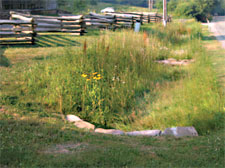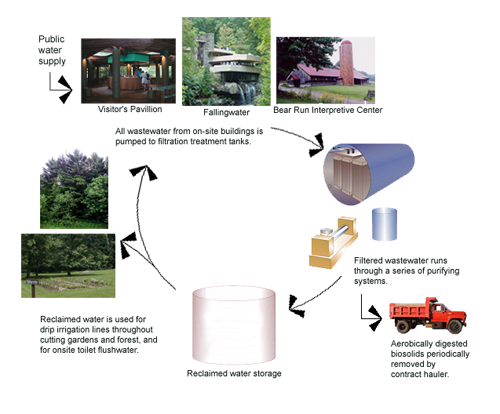Fallingwater Sets the Bar for Watershed Protection
Water is the defining element at Fallingwater, and while visitors may delight in the sound of Bear Run cascading below the house’s cantilevers, few may know of the Western Pennsylvania Conservancy’s cutting-edge approaches to keeping the watershed pristine.
Fallingwater and its surrounding site are serviced by a zero-discharge sewage treatment system that cleans and recycles its wastewater. The system was completed in April of 2001 with support from the Heinz Endowments and the Kresge Foundation.
“Our sewage treatment facility — the first of its kind in Pennsylvania — enables us to reuse most of the grey water onsite instead of discharging it into septic fields or sewer systems,” said Justin Gunther, curator of buildings and collections at Fallingwater. “Bear Run is an Exceptional Value stream — it’s drinking water pure — and we want to keep it that way.”

Bioswales, like this one near the Barn at Fallingwater, are also being installed as part of the visitors’ parking lot renovation.
“Microorganisms in the main tank consume solids and make it liquidy, and then thousands of spaghetti-thin membranes filter the wastewater further,” explained Fallingwater’s Director of Maintenance Jim Martin. “The tank is heated to 68 degrees year-round to keep the microorganisms alive.”
Sludge waste remains in the tank, while clean water is sent through carbon filters to remove any remaining micro-particles and disinfected in ultraviolet tubes before going to a holding tank for reuse.
Most of the water is sent back to flush toilets, although a small percentage is diverted to a drip field behind the Kirkpatrick House. Return lines are also set up to irrigate cutting gardens. ”And while post-treatment sludge waste is taken away, it could be used as compost,” Gunther said. “We’re not quite at the point of doing that yet, but we’re considering it.”
Gunther said the zero discharge system, engineered by CH2M Hill and featuring a Zenon filtration plant, is more efficient than the composting toilets used until about eight years ago, and has helped reduce Fallingwater’s need for municipal water, which contains unwanted chemicals.
Fallingwater is further enhancing its water conservation practices through the use of bioswales, which are currently being installed as part of the visitors’ parking lot reconstruction.
Bioswales are environmentally-friendly catch basins that slow storm water runoff.
Replacing storm drains with bioswales is expected to make a significant difference, by capturing and filtering runoff and keeping silt and automotive pollution out of the surrounding woods.
Gently sloped, filled with gravel and covered by a nutrient-rich compost or soil, the three eight-foot wide bioswales also will stem erosion by letting water seep into the ground gradually. “Perforated pipes underneath will help ensure the water is discharged slowly,” said Martin. “It will be much better for the watershed than the storm drains we use now.”

Visitors will notice the bioswales, which will be attractively planted with native vegetation and placed to create a more aesthetically pleasing parking experience.
The parking lot reconstruction, designed by MTR Landscape Architects of Pittsburgh, is slated for completion in spring 2011, in time for Fallingwater’s 75th Anniversary celebration.
